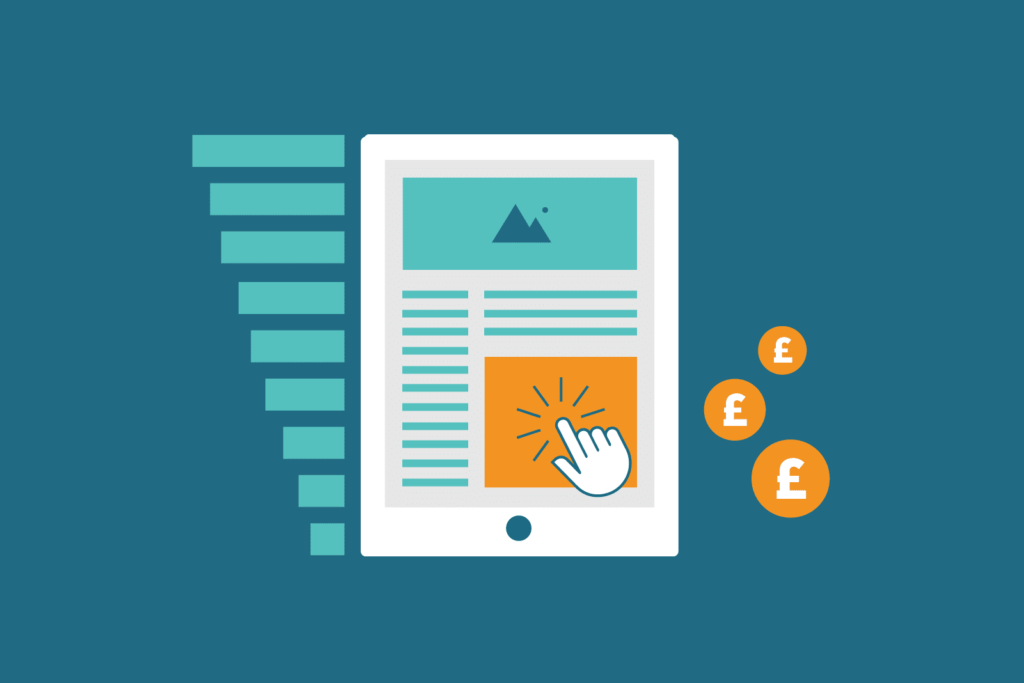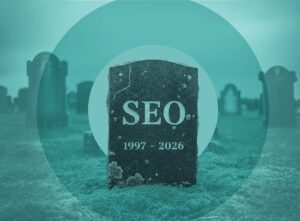
When you're trying to coax the maximum number of "right" eyeballs to your website, pay-per-click (PPC) and search engine optimisation (SEO) are often treated as estranged cousins at a family reunion. Big mistake. Combining PPC and SEO efforts is far more effective and creates a cohesive marketing strategy that accelerates results by leaning on each other. We call it Blended Search. Here's how it works.
Why PPC and SEO strategies are a powerful combination
Boost search engine results page (SERP) visibility
Achieving high search engine visibility for your website is always the goal, right? Yet, Google is perpetually updating the search engine results pages experience. This means your hard-won organic keyword rankings are increasingly nudged downwards by Google’s latest obsession. That could be:
- AI overviews
- Featured snippets
- Knowledge graphs
- "People Also Ask" boxes
- Images
- Videos
- News results
- Shopping results
- Maps
Oh, and who could forget those rather prominent paid search ads? Hint, hint.
Google’s consistent updates are changing the way we think about SEO. Because to truly maximise your website's visibility, it needs to be unmissable in the SERPs - which is becoming increasingly difficult.
However, by integrating PPC and SEO, you don’t just increase your brand’s prominence; you give it the best possible chance of appearing at the top of the search engine results pages.
How PPC and SEO data inform each other
Here's where the magic truly happens. Data from both PPC and SEO tools, when fused, creates a richer, more focused search marketing strategy. It allows you to attract the right users at the right time.
Let’s take the search terms report from Google Ads as an example. It’s a juicy list of relevant search terms that triggered a PPC ad and resulted in clicks through to your website. This information is invaluable for informing your SEO keyword priorities and gives you a head start in understanding what users are actually searching for. The PPC data gleaned here is, to put it mildly, invaluable to your SEO strategy.
Google Ads also allows for the kind of multivariate testing of PPC keywords, titles, and descriptions that would make an SEO specialist weep with joy at its speed, quickly revealing which variations drive higher click-through rates and conversions.
You can use PPC campaigns to test potential organic keyword targets to see if they're worth the long-term SEO investment. This is a much faster method than traditional SEO split testing. The insights from both SEO and PPC data are truly invaluable to both teams. This harmonious exchange of PPC and SEO data is what makes combined PPC and SEO strategies so potent.
Focus on effective strategies and eliminate digital duplication
The data gleaned from your PPC campaigns provides a valuable head start for your SEO strategy. You can instantly pivot to focus on topic areas that are already driving clicks and conversions, then expand on them with clever content clusters and targeted pages.
Prioritising relevant keywords and ad copy that boast high click-through rates gives your team a clear indication of strong user engagement. What proves effective for PPC ads can directly guide your SEO efforts. While direct copying and pasting isn't recommended (we're not barbarians), do consider the tone, style, and PPC keywords that are attracting attention from potential users.
For example, your most effective ad copy from your PPC campaigns can inspire fresh title tags for organic content, and engaging PPC ad descriptions could form the basis of compelling meta descriptions. There's no need for your teams to reinvent the wheel. This integrated approach enhances your digital marketing strategy simply by adding an SEO spoke to the well-established paid search wheel.
Structure your strategy: the long game meets the immediate win
SEO often involves a delightful "slow burn," with results that build value over time. PPC, on the other hand, can provide immediate visibility at the very top of the search results page.
This means that PPC can strategically support your SEO efforts by quickly securing visibility for your target keywords while you work on producing content and optimising on-page elements to increase your organic search reach.
SEO can also strategically support PPC campaigns by producing supporting organic content for long-tail cluster topics. These targets are more than likely not suitable for PPC campaigns due to their position in the customer journey, but still offer audiences important and valuable information before they make a purchase.
Additional benefits of integrated SEO and PPC strategies – the unseen upsides
Enhanced remarketing opportunities: The art of the second chance
Combining PPC and SEO creates genuinely powerful efficiencies and remarketing opportunities. For example:
- PPC can target users who found your site through organic search but didn't convert: You can set up remarketing ad campaigns to re-engage users who visited specific pages via organic search results but, for whatever reason, didn't complete a desired action (e.g., a purchase, a sign-up).
- Organic content nurtures leads for PPC: Users who discover your brand through informative organic content might not be ready to convert immediately. Remarketing ads can then serve them targeted display ads later, pushing them (gently, of course) further down the sales funnel.
SEO builds the initial interest, and PPC capitalises on it, making your search marketing much more effective. This interplay is the hallmark of intelligent PPC and SEO strategies.
Complementary keyword strategy: the two sides of the same coin
PPC and SEO keywords truly complement each other with the right strategy; here's how:
- Protecting branded terms: PPC can act as a vigilant guard dog, protecting your branded relevant keywords from competitors bidding on them. This ensures your brand always appears at the top for its own search results, even if your organic rankings aren't always number one.
- Filling in organic gaps: PPC can quickly target valuable PPC keywords where your organic rankings are a bit weaker or non-existent at the moment. It drives immediate traffic while your SEO strategy works to improve organic search results visibility for those terms. It's a strategic placeholder, ensuring no valuable traffic is lost.
- Discovering new opportunities: PPC testing can uncover new, high-converting long-tail relevant keywords that SEO can then build content around, expanding your overall organic search reach and boosting organic traffic. This combined approach is key for maximising your presence across the search engine.
Cost-effectiveness and ROI:
If you're thinking, "This marketing strategy sounds great, I bet it’s expensive", good news, it doesn't have to be. In fact, it can actually work out cheaper in the long run. Here’s how to make this strategy as cost-effective as possible:
-
- Optimising ad spend: Insights from SEO (e.g., knowing which organic keywords are already driving significant organic traffic) can help refine PPC campaigns, so you are not bidding on keywords that you already rank for organically. This smart use of data significantly improves budget efficiency.
- Maximising lifetime value: The combined efforts of both SEO and paid search lead to more opportunities to reach your target audience, especially when you use remarketing ads for people who have reached you organically. This can result in better conversion rates and, crucially, a higher customer lifetime value. Ultimately, this dramatically improves overall ROI for your entire search marketing endeavour.
- Long-term vs. short-term gains: While PPC ads offer immediate, gratifying results, SEO provides sustainable, long-term organic traffic. Using both SEO and paid search balances short-term gains with long-term growth.
- Marketing efficiency: With SEO and Paid teams working together, they will be communicating about what's working, what's not and where budget should be spent and where it shouldn't. So, rather than throwing spaghetti at a wall to see what sticks, teams can work together to maximise results and spend budget where it will have the biggest impact.
The symphony of search: When paid search and SEO work together
Ultimately, treating PPC and SEO strategies as separate, siloed entities is a missed opportunity. Which is why we developed Blended Search. By integrating search marketing strategies and leveraging the insights from each, you can create a robust, resilient, and highly effective digital search engine ecosystem that consistently drives relevant traffic, enhances brand authority, and maximises return on investment.
As Matt, our humble leader, said on the Future of Search webinar recently, "it's not just about doing more; it's about doing more, smarter". This integrated PPC and SEO performance approach is the smarter strategy. We call it Blended Search, and it's the future of digital marketing.
To learn more about the Blended Search approach, get in touch.





